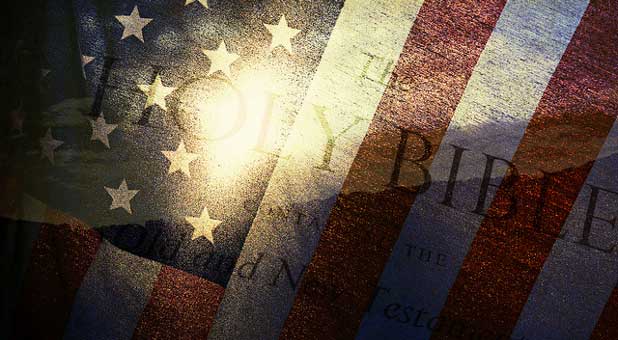Read Time: 3 Minutes 59 Seconds
If America becomes a Christian nation once again, it will come from below—from “we the people.” It will not come from politicians in Washington, D.C. Consider the following facts.
America was considered a Christian nation for the first 150 years of her existence, not because of an act of Congress or judicial decree, but because of the organic faith of the vast majority of her inhabitants. This faith of “we the people” flowed upward and influenced all the cultural and government institutions of the nation.
The First Great Awakening
This remarkable Christianizing of the American populace was the fruit of the First Great Awakening, which may be dated from 1726-1770. So many turned to Christ in this remarkable revival that critical mass was achieved, and the revival’s influence was felt everywhere.
As a result, the Continental Congress opened each session with prayer and Christian chaplains were appointed to the military and to Congress. George Washington took the first presidential oath of office with his hand on the sacred book of Christians—the Bible. He also declared a National Day of Prayer and Thanksgiving to God.
America was a Christian nation, not by an act of Congress, but by the faith-filled actions of her citizenry. John Marshall, the second Chief Justice of the U.S. Supreme Court, understood this. Serving as Chief Justice for 34 years from 1801-1834, Marshall wrote,
The American population is entirely Christian, and with us Christianity and religion are identified. It would be strange, indeed, if with such a people, our institutions did not presuppose Christianity, and did not refer to it, and exhibit relations with it (Hyatt, “1726: The Year that Defined America,” 169).
The Second Great Awakening
America has experienced at least three Great Awakenings that have impacted the values and cultural direction of the nation. Each one served to restore Christian faith during times of spiritual indifference and apostasy. The Second Great Awakening (1801-40), for example, reversed the negative influences of Deism and the French Revolution that had gained ascendancy during latter days of the 18th century.
The American historian, Dr. Mark Noll, called this Second Great Awakening, “the most influential revival in the history of the United States.” Peter Cartwright, a circuit riding Methodist clergyman, wrote of this revival, saying, “The work went on and spread almost in every direction, gathering additional force ’til our country seemed all coming to God” (Hyatt, “1726: The Year that Defined America,” 175).
The Third Great Awakening
The Third Great Awakening has been called “The Great Prayer Awakening of 1857-58.” This great prayer revival touched every part of American society. Churches and public halls became filled night and day with people pouring out their hearts to God in prayer.
Presidents Franklin Pierce (1853-57) and James Buchannan (1857-61) attended prayer meetings that were organized in Washington, D.C. The famous revivalist, Charles G. Finney, said that “a divine influence seemed to pervade the whole land” (Hyatt, “The Great Prayer Awakening of 1857-58,” 26). Fervent prayer continued throughout the Civil War, saving the nation from total ruin.
President Abraham Lincoln (1861-65), for example, told of his prayer response when he heard that General Robert E. Lee was marching into Pennsylvania with 76,000 Confederate troops. With everyone panicking, Lincoln went into his office, closed the door and got down on his knees.
As he poured out his heart to God, the answer came in a clear and distinct manner. He said, “A sweet comfort crept into my soul that God Almighty had taken the whole business into His own hands.” Lee was defeated at the Battle of Gettysburg, and it proved to be the turning point of the war. The American Union was saved.
The Supreme Court Recognizes Our Christian Character
In 1892, the U.S. Supreme Court declared America to be a Christian nation, not because of an act of Congress, but because of these Awakenings, and numerous local and regional revivals, that had impacted the faith of the people. In the ruling, “Church of the Holy Trinity vs The United States,” the nation’s highest court declared.
The churches and church organizations which abound in every city, town and hamlet; the multitude of charitable organizations existing everywhere under Christian auspices; the gigantic missionary associations, with general support, and aiming to establish Christian missions in every quarter of the globe. These, and many other matters which might be noticed, add a volume of unofficial declarations to the mass of organic utterances that this is a Christian nation
Notice that the Court did not decree America to be a Christian nation by judicial fiat, but merely acknowledged the fact that she was a Christian nation because of the pervasive, organic faith of her citizens.
The Only Clear Path to Being a Christian Nation
For those who want America to once again be a Christian nation, it will not happen via a political route. It will not happen by an act of Congress. It will not come by an executive order from the White House. That is the old Constantinian approach and is the politicized form of Christianity our ancestors fled from in Europe.
I am certain that America’s founders would approve this message. {eoa}
For the rest of this article, visit biblicalawakeningblogspot.com.
Bring Charisma magazine home with a subscription today!
Dr. Eddie Hyatt has a passion to see America return to her founding principles of faith and freedom. This article is derived from his books, “1726: The Year that Defined America“ and “The Great Prayer Awakening of 1857-58,” available from Amazon and his website at http://eddiehyatt.com.















































